With the small matter of an England-Scotland match to look forward to at Euro 2020, in preparation for the main event, I thought it would be an opportune moment for a match-up of a different kind – an England-Scotland five-a-side of autobiographies, mixing and matching across history.
England
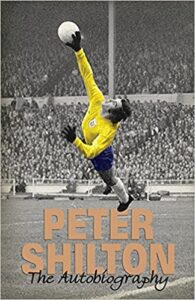 GK: Peter Shilton – The Autobiography/Saved – England’s record appearance maker, Peter Shilton won some 125 caps across a career spanning two decades. He represented England at five major tournaments, including Euro 1980 and 1988 and the 1982, 1986 and 1990 World Cup, and shares the record for most World Cup clean sheets (10) with Fabien Barthez. Peter Shilton’s domestic career took in some 11 teams, including Leicester City, Stoke City and Notts Forest. His forthcoming second autobiography, Saved, to be published in September, will reflect on his struggle with gambling.
GK: Peter Shilton – The Autobiography/Saved – England’s record appearance maker, Peter Shilton won some 125 caps across a career spanning two decades. He represented England at five major tournaments, including Euro 1980 and 1988 and the 1982, 1986 and 1990 World Cup, and shares the record for most World Cup clean sheets (10) with Fabien Barthez. Peter Shilton’s domestic career took in some 11 teams, including Leicester City, Stoke City and Notts Forest. His forthcoming second autobiography, Saved, to be published in September, will reflect on his struggle with gambling.
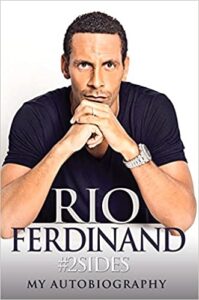 Def: Rio Ferdinand – Rio: My Story/Rio: My Decade as a Red/#2Sides – My Autobiography/Thinking Out Loud – With no autobiography by arguably England’s best ever defender, Bobby Moore, Rio Ferdinand steps in as England’s second-most capped central defender (behind Bobby Moore), with some 81 caps and 3 goals. Featuring for England from 1997 through to 2011, Ferdinand was included in three World Cup squads, as well as Euro 2008. Domestically, he won the Premier League, League Cup, Community Shield, Champions League and Club World Cup. His most recent book was published in 2017.
Def: Rio Ferdinand – Rio: My Story/Rio: My Decade as a Red/#2Sides – My Autobiography/Thinking Out Loud – With no autobiography by arguably England’s best ever defender, Bobby Moore, Rio Ferdinand steps in as England’s second-most capped central defender (behind Bobby Moore), with some 81 caps and 3 goals. Featuring for England from 1997 through to 2011, Ferdinand was included in three World Cup squads, as well as Euro 2008. Domestically, he won the Premier League, League Cup, Community Shield, Champions League and Club World Cup. His most recent book was published in 2017.
 MF: Bobby Charlton – My Manchester United Years/My England Years/My Life in Football/1966: My World Cup Story – One of England’s 1966 heroes, Bobby Charlton won the Ballon d’Or in the same year and was also named FWA Footballer of the Year. He sits seventh on the list of appearances for England, with 106, and second on the list of top goal-scorers, having notched 49 in his career. A noted member of the Busby Babes, Charlton made over 600 appearances for Manchester United and had a career spanning nearly 25 years. Charlton’s clutch of autobiographies cover his impressive career, with the latest charting that epic World Cup triumph.
MF: Bobby Charlton – My Manchester United Years/My England Years/My Life in Football/1966: My World Cup Story – One of England’s 1966 heroes, Bobby Charlton won the Ballon d’Or in the same year and was also named FWA Footballer of the Year. He sits seventh on the list of appearances for England, with 106, and second on the list of top goal-scorers, having notched 49 in his career. A noted member of the Busby Babes, Charlton made over 600 appearances for Manchester United and had a career spanning nearly 25 years. Charlton’s clutch of autobiographies cover his impressive career, with the latest charting that epic World Cup triumph.
 MF: Kevin Keegan – My Autobiography/My Life in Football – The only English footballer to have won the Ballon d’Or twice, Kevin Keegan captained England at Italy 1980. However, with England missing out on both the 1974 and 1978 World Cups, Keegan featured only in Spain 1982, but briefly due to injury. Across his career, Keegan won 63 caps and scored 21 goals, whilst domestic success came most notably at Liverpool. Following management spells with Newcastle and Fulham, Keegan stepped into the England role for one year. His second autobiography was published in 2018.
MF: Kevin Keegan – My Autobiography/My Life in Football – The only English footballer to have won the Ballon d’Or twice, Kevin Keegan captained England at Italy 1980. However, with England missing out on both the 1974 and 1978 World Cups, Keegan featured only in Spain 1982, but briefly due to injury. Across his career, Keegan won 63 caps and scored 21 goals, whilst domestic success came most notably at Liverpool. Following management spells with Newcastle and Fulham, Keegan stepped into the England role for one year. His second autobiography was published in 2018.
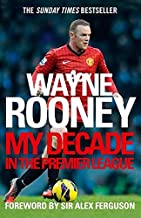 Striker: Wayne Rooney – The Way It Is/My Decade in the Premier League – Wayne Rooney holds the record as both England’s youngest ever goalscorer and the Three Lions’ top scorer, having bagged 53 goals in 120 appearances – whilst sitting second in the most caps chart. His England career spanned some 15 years, including appearances at Euro 2004, 2012 and 2016, and World Cup 2006, 2010 and 2014. Domestically, he holds the record as Manchester United’s top goalscorer, with 253 goals to his name, and is one of only two English players to have won the Premier League, FA Cup, Champions League, League Cup, Europa League and Club World Cup. His second autobiography was published in 2012.
Striker: Wayne Rooney – The Way It Is/My Decade in the Premier League – Wayne Rooney holds the record as both England’s youngest ever goalscorer and the Three Lions’ top scorer, having bagged 53 goals in 120 appearances – whilst sitting second in the most caps chart. His England career spanned some 15 years, including appearances at Euro 2004, 2012 and 2016, and World Cup 2006, 2010 and 2014. Domestically, he holds the record as Manchester United’s top goalscorer, with 253 goals to his name, and is one of only two English players to have won the Premier League, FA Cup, Champions League, League Cup, Europa League and Club World Cup. His second autobiography was published in 2012.
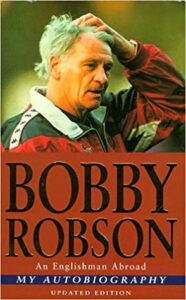 Manager: Bobby Robson – An Autobiography/Bobby Robson: An Englishman Abroad/Farewell but not Goodbye/My Kind of Toon – Whilst it was Alf Ramsey who led England to World Cup success, it was Bobby Robson who oversaw their best post-World Cup campaign, prior to Gareth Southgate’s arrival, leading the Three Lions to the semi-finals of Italia 90. He was at the helm for eight years, winning some 47 of his 95 games in charge, and led England at Mexico 1986 and Euro 1988. As a player, he represented England 20 times, scoring 4 goals, and had a successful managerial career at Ipswich, Barcelona and notably his hometown of Newcastle. As well as a number of autobiographies, Harry De Cosemo’s Black and White Knight was published earlier this year.
Manager: Bobby Robson – An Autobiography/Bobby Robson: An Englishman Abroad/Farewell but not Goodbye/My Kind of Toon – Whilst it was Alf Ramsey who led England to World Cup success, it was Bobby Robson who oversaw their best post-World Cup campaign, prior to Gareth Southgate’s arrival, leading the Three Lions to the semi-finals of Italia 90. He was at the helm for eight years, winning some 47 of his 95 games in charge, and led England at Mexico 1986 and Euro 1988. As a player, he represented England 20 times, scoring 4 goals, and had a successful managerial career at Ipswich, Barcelona and notably his hometown of Newcastle. As well as a number of autobiographies, Harry De Cosemo’s Black and White Knight was published earlier this year.
Scotland
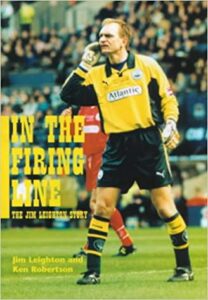 GK: Jim Leighton – In the Firing Line – With 91 caps to his name, Jim Leighton is the most capped Scottish goalkeeper, whilst sitting behind only Kenny Dalglish overall. His Scotland career spanned some 16 years from 1982 to 1998, which included two World Cups in 1986 and 1990. Whilst he missed out on Euro 92 and Euro 96, he returned as number one in the World Cup 1998 qualification and became the oldest player to play for Scotland aged 40 years and 78 days before David Weir surpassed this. His autobiography was published in 2000.
GK: Jim Leighton – In the Firing Line – With 91 caps to his name, Jim Leighton is the most capped Scottish goalkeeper, whilst sitting behind only Kenny Dalglish overall. His Scotland career spanned some 16 years from 1982 to 1998, which included two World Cups in 1986 and 1990. Whilst he missed out on Euro 92 and Euro 96, he returned as number one in the World Cup 1998 qualification and became the oldest player to play for Scotland aged 40 years and 78 days before David Weir surpassed this. His autobiography was published in 2000.
 Def: Willie Miller – The Miller’s Tale/The Don/Willie Miller’s Aberdeen Dream Team – Described by Sir Alex Ferguson as ‘the best penalty box defender in the world’, Willie Miller featured for Scotland from 1975 to 1989, amassing 65 caps and one goal. He competed at the 1986 World Cup, but injury meant he missed out in 1990 and ultimately had to retire. Miller’s domestic career was spent entirely at Aberdeen (with a brief loan spell at Peterhead), where he notched up a club record 560 appearances, as well as 21 goals, in a 19-year career. He has three books to his name.
Def: Willie Miller – The Miller’s Tale/The Don/Willie Miller’s Aberdeen Dream Team – Described by Sir Alex Ferguson as ‘the best penalty box defender in the world’, Willie Miller featured for Scotland from 1975 to 1989, amassing 65 caps and one goal. He competed at the 1986 World Cup, but injury meant he missed out in 1990 and ultimately had to retire. Miller’s domestic career was spent entirely at Aberdeen (with a brief loan spell at Peterhead), where he notched up a club record 560 appearances, as well as 21 goals, in a 19-year career. He has three books to his name.
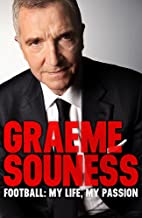 MF: Graeme Souness – No Half Measures/Graeme Souness: A Manager’s Diary/Souness: The Management Years/Graeme Souness – Football: My Life, My Passion – Across 12 years, Graeme Souness made 54 appearances for the Tartan Army, scoring four goals. In his time, he featured at three World Cups, including Argentina 1978, Spain 1982 and Mexico 1986. At club level, he made his name captaining a Liverpool side that dominated in the late 1970s/early 1980s before moving on to Sampdoria and later Rangers. A twenty-year managerial career ended at Newcastle in 2006 before Souness made the move into the media. His most recent autobiography was published in 2017.
MF: Graeme Souness – No Half Measures/Graeme Souness: A Manager’s Diary/Souness: The Management Years/Graeme Souness – Football: My Life, My Passion – Across 12 years, Graeme Souness made 54 appearances for the Tartan Army, scoring four goals. In his time, he featured at three World Cups, including Argentina 1978, Spain 1982 and Mexico 1986. At club level, he made his name captaining a Liverpool side that dominated in the late 1970s/early 1980s before moving on to Sampdoria and later Rangers. A twenty-year managerial career ended at Newcastle in 2006 before Souness made the move into the media. His most recent autobiography was published in 2017.
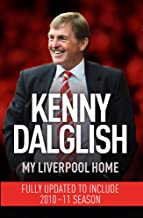 MF: Kenny Dalglish – My Autobiography/My Liverpool Home/Kenny Dalglish: Notes on a Season – As well as a legend of Celtic and Liverpool, Kenny Dalglish wrote his name into the Scottish history books, by being the most capped Scottish player, with 102 caps, and matching Denis Law as Scotland’s top goalscorer. During his career, he won the PFA Player’s Player of the Year and FWA Footballer of the Year twice, whilst being runner-up to Michel Platini for the Ballon d’Or in 1983. He was inducted to both the English and Scottish Football Halls of Fame. As well as two autobiographies, Dalglish’s Notes on a Season compiles his programmes notes from the 1989/90 season as Liverpool manager.
MF: Kenny Dalglish – My Autobiography/My Liverpool Home/Kenny Dalglish: Notes on a Season – As well as a legend of Celtic and Liverpool, Kenny Dalglish wrote his name into the Scottish history books, by being the most capped Scottish player, with 102 caps, and matching Denis Law as Scotland’s top goalscorer. During his career, he won the PFA Player’s Player of the Year and FWA Footballer of the Year twice, whilst being runner-up to Michel Platini for the Ballon d’Or in 1983. He was inducted to both the English and Scottish Football Halls of Fame. As well as two autobiographies, Dalglish’s Notes on a Season compiles his programmes notes from the 1989/90 season as Liverpool manager.
 Striker: Denis Law – The King: My Autobiography/Denis Law: My Life in Football – Joint top goalscorer in Scotland’s history, Denis Law’s tally of 30 is made all the more impressive having scored them in some 55 games for his country. Missing out on the 1958 World Cup, Law would feature in only the 1974 World Cup but was still named Scotland’s Golden Player – the most outstanding player of the past 50 years – by the Scottish Football Association. He won the Ballon d’Or in 1964 and was included in the PFA Team of the Century. His most recent autobiography was released in 2011.
Striker: Denis Law – The King: My Autobiography/Denis Law: My Life in Football – Joint top goalscorer in Scotland’s history, Denis Law’s tally of 30 is made all the more impressive having scored them in some 55 games for his country. Missing out on the 1958 World Cup, Law would feature in only the 1974 World Cup but was still named Scotland’s Golden Player – the most outstanding player of the past 50 years – by the Scottish Football Association. He won the Ballon d’Or in 1964 and was included in the PFA Team of the Century. His most recent autobiography was released in 2011.
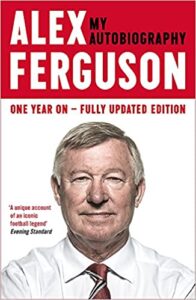 Manager: Alex Ferguson – Managing My Life/My Autobiography/Leading – With no autobiography available by the legendary Scottish manager Jock Stein, despite only a brief spell in charge of the national team, Sir Alex Ferguson is chosen as manager after his incredible success on the domestic front. With an unparalleled haul of team and individual awards, Ferguson stands head and shoulders above most other managers, Scottish or otherwise, in his achievements and legacy. His most recent book, Leading, published in 2015, gives an insight into his managerial philosophy.
Manager: Alex Ferguson – Managing My Life/My Autobiography/Leading – With no autobiography available by the legendary Scottish manager Jock Stein, despite only a brief spell in charge of the national team, Sir Alex Ferguson is chosen as manager after his incredible success on the domestic front. With an unparalleled haul of team and individual awards, Ferguson stands head and shoulders above most other managers, Scottish or otherwise, in his achievements and legacy. His most recent book, Leading, published in 2015, gives an insight into his managerial philosophy.
 The European Championships are held every four years, in the even years between World Cups, and is the pinnacle of the national competition for members of UEFA. French Football Federation’s Secretary-General Henri Delaunay had first muted the idea for such a tournament back in 1927, but it was not to see the light of day until 1958 when seventeen countries entered the qualifiers.
The European Championships are held every four years, in the even years between World Cups, and is the pinnacle of the national competition for members of UEFA. French Football Federation’s Secretary-General Henri Delaunay had first muted the idea for such a tournament back in 1927, but it was not to see the light of day until 1958 when seventeen countries entered the qualifiers.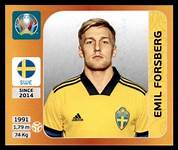 Group E: Sweden (0) 1 – 0 (0) Slovakia
Group E: Sweden (0) 1 – 0 (0) Slovakia Group D: Croatia (0) 1 – 1 (1) Czech Republic
Group D: Croatia (0) 1 – 1 (1) Czech Republic Group D: England (0) 0 – 0 (0) Scotland
Group D: England (0) 0 – 0 (0) Scotland Group C: Ukraine (2) 2 – 1 (0) North Macedonia
Group C: Ukraine (2) 2 – 1 (0) North Macedonia Group B: Denmark (1) 1 – 2 (0) Belgium
Group B: Denmark (1) 1 – 2 (0) Belgium Group C: Netherlands (0) 0 – 0 (0) Austria
Group C: Netherlands (0) 0 – 0 (0) Austria GK: Peter Shilton – The Autobiography/Saved – England’s record appearance maker, Peter Shilton won some 125 caps across a career spanning two decades. He represented England at five major tournaments, including Euro 1980 and 1988 and the 1982, 1986 and 1990 World Cup, and shares the record for most World Cup clean sheets (10) with Fabien Barthez. Peter Shilton’s domestic career took in some 11 teams, including Leicester City, Stoke City and Notts Forest. His forthcoming second autobiography, Saved, to be published in September, will reflect on his struggle with gambling.
GK: Peter Shilton – The Autobiography/Saved – England’s record appearance maker, Peter Shilton won some 125 caps across a career spanning two decades. He represented England at five major tournaments, including Euro 1980 and 1988 and the 1982, 1986 and 1990 World Cup, and shares the record for most World Cup clean sheets (10) with Fabien Barthez. Peter Shilton’s domestic career took in some 11 teams, including Leicester City, Stoke City and Notts Forest. His forthcoming second autobiography, Saved, to be published in September, will reflect on his struggle with gambling. Def: Rio Ferdinand – Rio: My Story/Rio: My Decade as a Red/#2Sides – My Autobiography/Thinking Out Loud – With no autobiography by arguably England’s best ever defender, Bobby Moore, Rio Ferdinand steps in as England’s second-most capped central defender (behind Bobby Moore), with some 81 caps and 3 goals. Featuring for England from 1997 through to 2011, Ferdinand was included in three World Cup squads, as well as Euro 2008. Domestically, he won the Premier League, League Cup, Community Shield, Champions League and Club World Cup. His most recent book was published in 2017.
Def: Rio Ferdinand – Rio: My Story/Rio: My Decade as a Red/#2Sides – My Autobiography/Thinking Out Loud – With no autobiography by arguably England’s best ever defender, Bobby Moore, Rio Ferdinand steps in as England’s second-most capped central defender (behind Bobby Moore), with some 81 caps and 3 goals. Featuring for England from 1997 through to 2011, Ferdinand was included in three World Cup squads, as well as Euro 2008. Domestically, he won the Premier League, League Cup, Community Shield, Champions League and Club World Cup. His most recent book was published in 2017. MF: Bobby Charlton – My Manchester United Years/My England Years/My Life in Football/1966: My World Cup Story – One of England’s 1966 heroes, Bobby Charlton won the Ballon d’Or in the same year and was also named FWA Footballer of the Year. He sits seventh on the list of appearances for England, with 106, and second on the list of top goal-scorers, having notched 49 in his career. A noted member of the Busby Babes, Charlton made over 600 appearances for Manchester United and had a career spanning nearly 25 years. Charlton’s clutch of autobiographies cover his impressive career, with the latest charting that epic World Cup triumph.
MF: Bobby Charlton – My Manchester United Years/My England Years/My Life in Football/1966: My World Cup Story – One of England’s 1966 heroes, Bobby Charlton won the Ballon d’Or in the same year and was also named FWA Footballer of the Year. He sits seventh on the list of appearances for England, with 106, and second on the list of top goal-scorers, having notched 49 in his career. A noted member of the Busby Babes, Charlton made over 600 appearances for Manchester United and had a career spanning nearly 25 years. Charlton’s clutch of autobiographies cover his impressive career, with the latest charting that epic World Cup triumph. MF: Kevin Keegan – My Autobiography/My Life in Football – The only English footballer to have won the Ballon d’Or twice, Kevin Keegan captained England at Italy 1980. However, with England missing out on both the 1974 and 1978 World Cups, Keegan featured only in Spain 1982, but briefly due to injury. Across his career, Keegan won 63 caps and scored 21 goals, whilst domestic success came most notably at Liverpool. Following management spells with Newcastle and Fulham, Keegan stepped into the England role for one year. His second autobiography was published in 2018.
MF: Kevin Keegan – My Autobiography/My Life in Football – The only English footballer to have won the Ballon d’Or twice, Kevin Keegan captained England at Italy 1980. However, with England missing out on both the 1974 and 1978 World Cups, Keegan featured only in Spain 1982, but briefly due to injury. Across his career, Keegan won 63 caps and scored 21 goals, whilst domestic success came most notably at Liverpool. Following management spells with Newcastle and Fulham, Keegan stepped into the England role for one year. His second autobiography was published in 2018. Striker: Wayne Rooney – The Way It Is/My Decade in the Premier League – Wayne Rooney holds the record as both England’s youngest ever goalscorer and the Three Lions’ top scorer, having bagged 53 goals in 120 appearances – whilst sitting second in the most caps chart. His England career spanned some 15 years, including appearances at Euro 2004, 2012 and 2016, and World Cup 2006, 2010 and 2014. Domestically, he holds the record as Manchester United’s top goalscorer, with 253 goals to his name, and is one of only two English players to have won the Premier League, FA Cup, Champions League, League Cup, Europa League and Club World Cup. His second autobiography was published in 2012.
Striker: Wayne Rooney – The Way It Is/My Decade in the Premier League – Wayne Rooney holds the record as both England’s youngest ever goalscorer and the Three Lions’ top scorer, having bagged 53 goals in 120 appearances – whilst sitting second in the most caps chart. His England career spanned some 15 years, including appearances at Euro 2004, 2012 and 2016, and World Cup 2006, 2010 and 2014. Domestically, he holds the record as Manchester United’s top goalscorer, with 253 goals to his name, and is one of only two English players to have won the Premier League, FA Cup, Champions League, League Cup, Europa League and Club World Cup. His second autobiography was published in 2012. Manager: Bobby Robson – An Autobiography/Bobby Robson: An Englishman Abroad/Farewell but not Goodbye/My Kind of Toon – Whilst it was Alf Ramsey who led England to World Cup success, it was Bobby Robson who oversaw their best post-World Cup campaign, prior to Gareth Southgate’s arrival, leading the Three Lions to the semi-finals of Italia 90. He was at the helm for eight years, winning some 47 of his 95 games in charge, and led England at Mexico 1986 and Euro 1988. As a player, he represented England 20 times, scoring 4 goals, and had a successful managerial career at Ipswich, Barcelona and notably his hometown of Newcastle. As well as a number of autobiographies, Harry De Cosemo’s Black and White Knight was published earlier this year.
Manager: Bobby Robson – An Autobiography/Bobby Robson: An Englishman Abroad/Farewell but not Goodbye/My Kind of Toon – Whilst it was Alf Ramsey who led England to World Cup success, it was Bobby Robson who oversaw their best post-World Cup campaign, prior to Gareth Southgate’s arrival, leading the Three Lions to the semi-finals of Italia 90. He was at the helm for eight years, winning some 47 of his 95 games in charge, and led England at Mexico 1986 and Euro 1988. As a player, he represented England 20 times, scoring 4 goals, and had a successful managerial career at Ipswich, Barcelona and notably his hometown of Newcastle. As well as a number of autobiographies, Harry De Cosemo’s Black and White Knight was published earlier this year. GK: Jim Leighton – In the Firing Line – With 91 caps to his name, Jim Leighton is the most capped Scottish goalkeeper, whilst sitting behind only Kenny Dalglish overall. His Scotland career spanned some 16 years from 1982 to 1998, which included two World Cups in 1986 and 1990. Whilst he missed out on Euro 92 and Euro 96, he returned as number one in the World Cup 1998 qualification and became the oldest player to play for Scotland aged 40 years and 78 days before David Weir surpassed this. His autobiography was published in 2000.
GK: Jim Leighton – In the Firing Line – With 91 caps to his name, Jim Leighton is the most capped Scottish goalkeeper, whilst sitting behind only Kenny Dalglish overall. His Scotland career spanned some 16 years from 1982 to 1998, which included two World Cups in 1986 and 1990. Whilst he missed out on Euro 92 and Euro 96, he returned as number one in the World Cup 1998 qualification and became the oldest player to play for Scotland aged 40 years and 78 days before David Weir surpassed this. His autobiography was published in 2000. Def: Willie Miller – The Miller’s Tale/The Don/Willie Miller’s Aberdeen Dream Team – Described by Sir Alex Ferguson as ‘the best penalty box defender in the world’, Willie Miller featured for Scotland from 1975 to 1989, amassing 65 caps and one goal. He competed at the 1986 World Cup, but injury meant he missed out in 1990 and ultimately had to retire. Miller’s domestic career was spent entirely at Aberdeen (with a brief loan spell at Peterhead), where he notched up a club record 560 appearances, as well as 21 goals, in a 19-year career. He has three books to his name.
Def: Willie Miller – The Miller’s Tale/The Don/Willie Miller’s Aberdeen Dream Team – Described by Sir Alex Ferguson as ‘the best penalty box defender in the world’, Willie Miller featured for Scotland from 1975 to 1989, amassing 65 caps and one goal. He competed at the 1986 World Cup, but injury meant he missed out in 1990 and ultimately had to retire. Miller’s domestic career was spent entirely at Aberdeen (with a brief loan spell at Peterhead), where he notched up a club record 560 appearances, as well as 21 goals, in a 19-year career. He has three books to his name. MF: Graeme Souness – No Half Measures/Graeme Souness: A Manager’s Diary/Souness: The Management Years/Graeme Souness – Football: My Life, My Passion – Across 12 years, Graeme Souness made 54 appearances for the Tartan Army, scoring four goals. In his time, he featured at three World Cups, including Argentina 1978, Spain 1982 and Mexico 1986. At club level, he made his name captaining a Liverpool side that dominated in the late 1970s/early 1980s before moving on to Sampdoria and later Rangers. A twenty-year managerial career ended at Newcastle in 2006 before Souness made the move into the media. His most recent autobiography was published in 2017.
MF: Graeme Souness – No Half Measures/Graeme Souness: A Manager’s Diary/Souness: The Management Years/Graeme Souness – Football: My Life, My Passion – Across 12 years, Graeme Souness made 54 appearances for the Tartan Army, scoring four goals. In his time, he featured at three World Cups, including Argentina 1978, Spain 1982 and Mexico 1986. At club level, he made his name captaining a Liverpool side that dominated in the late 1970s/early 1980s before moving on to Sampdoria and later Rangers. A twenty-year managerial career ended at Newcastle in 2006 before Souness made the move into the media. His most recent autobiography was published in 2017. MF: Kenny Dalglish – My Autobiography/My Liverpool Home/Kenny Dalglish: Notes on a Season – As well as a legend of Celtic and Liverpool, Kenny Dalglish wrote his name into the Scottish history books, by being the most capped Scottish player, with 102 caps, and matching Denis Law as Scotland’s top goalscorer. During his career, he won the PFA Player’s Player of the Year and FWA Footballer of the Year twice, whilst being runner-up to Michel Platini for the Ballon d’Or in 1983. He was inducted to both the English and Scottish Football Halls of Fame. As well as two autobiographies, Dalglish’s Notes on a Season compiles his programmes notes from the 1989/90 season as Liverpool manager.
MF: Kenny Dalglish – My Autobiography/My Liverpool Home/Kenny Dalglish: Notes on a Season – As well as a legend of Celtic and Liverpool, Kenny Dalglish wrote his name into the Scottish history books, by being the most capped Scottish player, with 102 caps, and matching Denis Law as Scotland’s top goalscorer. During his career, he won the PFA Player’s Player of the Year and FWA Footballer of the Year twice, whilst being runner-up to Michel Platini for the Ballon d’Or in 1983. He was inducted to both the English and Scottish Football Halls of Fame. As well as two autobiographies, Dalglish’s Notes on a Season compiles his programmes notes from the 1989/90 season as Liverpool manager. Striker: Denis Law – The King: My Autobiography/Denis Law: My Life in Football – Joint top goalscorer in Scotland’s history, Denis Law’s tally of 30 is made all the more impressive having scored them in some 55 games for his country. Missing out on the 1958 World Cup, Law would feature in only the 1974 World Cup but was still named Scotland’s Golden Player – the most outstanding player of the past 50 years – by the Scottish Football Association. He won the Ballon d’Or in 1964 and was included in the PFA Team of the Century. His most recent autobiography was released in 2011.
Striker: Denis Law – The King: My Autobiography/Denis Law: My Life in Football – Joint top goalscorer in Scotland’s history, Denis Law’s tally of 30 is made all the more impressive having scored them in some 55 games for his country. Missing out on the 1958 World Cup, Law would feature in only the 1974 World Cup but was still named Scotland’s Golden Player – the most outstanding player of the past 50 years – by the Scottish Football Association. He won the Ballon d’Or in 1964 and was included in the PFA Team of the Century. His most recent autobiography was released in 2011. Manager: Alex Ferguson – Managing My Life/My Autobiography/Leading – With no autobiography available by the legendary Scottish manager Jock Stein, despite only a brief spell in charge of the national team, Sir Alex Ferguson is chosen as manager after his incredible success on the domestic front. With an unparalleled haul of team and individual awards, Ferguson stands head and shoulders above most other managers, Scottish or otherwise, in his achievements and legacy. His most recent book, Leading, published in 2015, gives an insight into his managerial philosophy.
Manager: Alex Ferguson – Managing My Life/My Autobiography/Leading – With no autobiography available by the legendary Scottish manager Jock Stein, despite only a brief spell in charge of the national team, Sir Alex Ferguson is chosen as manager after his incredible success on the domestic front. With an unparalleled haul of team and individual awards, Ferguson stands head and shoulders above most other managers, Scottish or otherwise, in his achievements and legacy. His most recent book, Leading, published in 2015, gives an insight into his managerial philosophy. Goal of the round: Scotland fans, look away now, but in truth it’s hard to look beyond Patrik Schick’s curling effort from just inside the Scottish half for the Czech Republic. The 25-year-old may not have been a household name before the tournament, but he’s catapulted himself to Euros fame surely with that goal, which will join the likes of Gazza and Van Basten in being wheeled out every four years. Andriy Yarmolenko can count himself unlucky that his goal against the Netherlands was upstaged by Schick.
Goal of the round: Scotland fans, look away now, but in truth it’s hard to look beyond Patrik Schick’s curling effort from just inside the Scottish half for the Czech Republic. The 25-year-old may not have been a household name before the tournament, but he’s catapulted himself to Euros fame surely with that goal, which will join the likes of Gazza and Van Basten in being wheeled out every four years. Andriy Yarmolenko can count himself unlucky that his goal against the Netherlands was upstaged by Schick. Standout player performance: While Romelu Lukaku and Kalvin Phillips both had strong starts for Belgium and England respectively, there’s one man that continues to dominate on whatever stage he graces – N’Golo Kante. Ask any fan if they’d take Kante in their team and I imagine not one refusal. In fact, it got me wondering, in the way my brain is wont to do, whether I’d prefer a team of Kantes or a team of Ronaldos. The jury is out, but one thing’s for sure, I’d bite your hand off for even one Kante – actually, I wonder if that was what Rudiger was doing to Pogba, but he decided to bite his neck instead of his hand? And when it comes to standout players, it would be impossible not to mention Denmark captain, Simon Kjaer, and his speedy reaction, empathetic response and strong leadership in the face of the most challenging circumstances. If Kante is the Euros general, Kjaer is its absolute commander.
Standout player performance: While Romelu Lukaku and Kalvin Phillips both had strong starts for Belgium and England respectively, there’s one man that continues to dominate on whatever stage he graces – N’Golo Kante. Ask any fan if they’d take Kante in their team and I imagine not one refusal. In fact, it got me wondering, in the way my brain is wont to do, whether I’d prefer a team of Kantes or a team of Ronaldos. The jury is out, but one thing’s for sure, I’d bite your hand off for even one Kante – actually, I wonder if that was what Rudiger was doing to Pogba, but he decided to bite his neck instead of his hand? And when it comes to standout players, it would be impossible not to mention Denmark captain, Simon Kjaer, and his speedy reaction, empathetic response and strong leadership in the face of the most challenging circumstances. If Kante is the Euros general, Kjaer is its absolute commander. Newcomers: North Macedonia played their first ever game in a major tournament, having qualified for the Euros through a play-off against Kosovo. The Lynxes may have lost their first outing 3-1 to Austria, but nevertheless it was a significant moment in the nation’s footballing history, and who other than North Macedonia’s captain, top scorer and top appearance-maker of all time, Goran Pandev, to bag the country’s first ever tournament goal, becoming the second-oldest scorer in the history of the Euros in doing so. North Macedonia face two further tough tests against Ukraine and the Netherlands, but they’ve already made history, so why not once more? Off the pitch, both Nigel de Jong and Emma Hayes have proved to be impressive acquisitions on the media front, as too has Hal Robson Kanu.
Newcomers: North Macedonia played their first ever game in a major tournament, having qualified for the Euros through a play-off against Kosovo. The Lynxes may have lost their first outing 3-1 to Austria, but nevertheless it was a significant moment in the nation’s footballing history, and who other than North Macedonia’s captain, top scorer and top appearance-maker of all time, Goran Pandev, to bag the country’s first ever tournament goal, becoming the second-oldest scorer in the history of the Euros in doing so. North Macedonia face two further tough tests against Ukraine and the Netherlands, but they’ve already made history, so why not once more? Off the pitch, both Nigel de Jong and Emma Hayes have proved to be impressive acquisitions on the media front, as too has Hal Robson Kanu.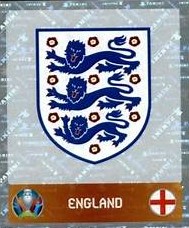 England: A nation waited in expectation, or perhaps with pessimism, as England’s campaign got underway against Croatia. But a 1-0 victory was enough to get fans charting England’s route to the final – after all, we’ve never won an opening game at the Euros before, surely, this is fate?! Or perhaps it was just a disciplined England team beating a subpar Croatia team? Either way, England did the job required of them and a three-point first-round haul was all that could be asked of from the first outing in what was generally an untroubled day at the office for the Three Lions. It’s too early to judge just where England stand on the back of this one performance, but, in truth, there was little in the first-round performances across the board that would give Southgate much cause for concern at this stage.
England: A nation waited in expectation, or perhaps with pessimism, as England’s campaign got underway against Croatia. But a 1-0 victory was enough to get fans charting England’s route to the final – after all, we’ve never won an opening game at the Euros before, surely, this is fate?! Or perhaps it was just a disciplined England team beating a subpar Croatia team? Either way, England did the job required of them and a three-point first-round haul was all that could be asked of from the first outing in what was generally an untroubled day at the office for the Three Lions. It’s too early to judge just where England stand on the back of this one performance, but, in truth, there was little in the first-round performances across the board that would give Southgate much cause for concern at this stage. Group E: Hungary (0) 0 – 3 (0) Portugal
Group E: Hungary (0) 0 – 3 (0) Portugal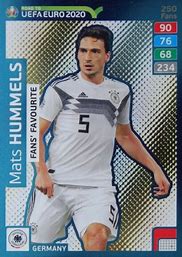 Group E: France (0) 1 – 0 (0) Germany
Group E: France (0) 1 – 0 (0) Germany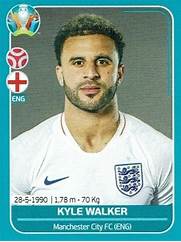 Right-back: Kyle Walker
Right-back: Kyle Walker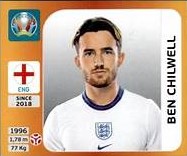 Left-back: Ben Chilwell
Left-back: Ben Chilwell Attacking-midfield: Phil Foden
Attacking-midfield: Phil Foden Striker: Harry Kane
Striker: Harry Kane And so it begins. After a wait of over a year, Euro 2020 (yes, we’re sticking with that) finally kicked off last night in Rome as Italy took on Turkey in Group A, and for once, it didn’t disappoint. It had everything from Nessun Dorma to dodgy offsides to super-size subs benches. But as I sum up some random observations from the opening fixture, there’s only one place to start, remote-controlled cars, naturally…
And so it begins. After a wait of over a year, Euro 2020 (yes, we’re sticking with that) finally kicked off last night in Rome as Italy took on Turkey in Group A, and for once, it didn’t disappoint. It had everything from Nessun Dorma to dodgy offsides to super-size subs benches. But as I sum up some random observations from the opening fixture, there’s only one place to start, remote-controlled cars, naturally… Group A: Turkey (0) 0 – 3 (0) Italy
Group A: Turkey (0) 0 – 3 (0) Italy